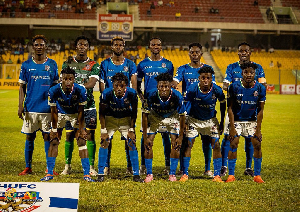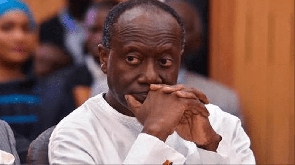…From September 24, 1979 To December 31, 1981 – The Story Of Betrayal Of Hope & Trust!
31 years ago this past Friday, to be precise, September 24, 1979, Ghanaians and the world community witnessed an elaborate ceremony during which the Armed Forces Revolutionary Council (AFRC) led by Flt. Lt. J.J. Rawlings handed over political power to the Nkrumaist People’s National Party (PNP) led by Dr, Hilla Limann.
This followed the outcome of one of Ghana’s freest and fairest competitive elections since independence in March 1957. The PNP which was mainly a re-grouping of members and supporters of Kwame Nkrumah’s Convention People’s Party (CPP) won both the presidential and parliamentary elections. The Nkrumaist political tradition had been in political limbo for 13 years since the overthrow of the Nkrumah-led CPP government on February 24, 1966 via a military cum police coup d’etat led by Kotoka and Afrifa.
But 27 months of the 3rd Republic saw the progressive, gradual emergence of a vibrant media, civil society activism including freedom to assemble and demonstrate, deepening of parliamentary democracy, respect for human rights and civil liberties, assertion of judicial independence among other civil-democratic rights.
However, that progressive development, albeit painfully slow, especially on the economic front, was treasonably disrupted by yet another military intervention in our national politics on December 31, 1981 via a so-called ‘Holy War’ led by a bunch of military upstarts inspired by Flt. Lt. J.J. Rawlings.
GHANA TODAY IS WIDELY TOUTED AS A GOOD EXAMPLE OF A GROWING AFRICAN DEMOCRACY BECAUSE AMONG OTHER THINGS, SHE HAS BEEN ABLE TO HOLD 5 ELECTIONS (1992, 1996, 2000, 2004, 2008) WHICH HAVE LED TO TWO QUALITATIVE TRANSFERS OF POWER FROM ONE POLITICAL PARTY TO ANOTHER (2000 & 2008).
Hardly do the analysts consider that but for that singular act of betrayal and treason committed by the so-called “Holy Warriors” on December 31, 1981, GHANA TODAY WOULD HAVE EXPERIENCED NOT 5 BUT 8 COMPETITIVE ELECTIONS (1979, 1983, 1987, 1991, 1995, 1999, 2003, 2007), WITH THE 9TH ONE WAITING IN THE WINGS FOR YEAR 2011!
OBVIOUSLY THE 8 OR 9 ELECTIONS WOULD HAVE COME WITH ITS ATTENDANT GROWING SPIRIT OF TOLERANCE, MUTUAL RESPECT, LESS ACRIMONY, MORE VIBRANT MEDIA CULTURE, HIGHER LEGISLATIVE OVER-SIGHT OF THE EXECUTIVE, STRONGER INSTITUTIONS OF STATE, CIVIL SOCIETY ACTIVISM AND POTENTIAL FOR ECONOMIC PROSPERITY, ETC.
However, that prospect was cut short by a bunch of marauding soldiers, some of them retired, who ‘elected’ themselves the saviours, liberators, redeemers and holy warriors of the good people of Ghana, and for 11 uninterrupted years, held the nation to ransom. In the process, hundreds of Ghanaians disappeared into thin air while thousands either run into exile, or were captured and detained for years without charge or trial. A reign of fear and terror was unleashed unto Ghanaians many of whom became subdued in silence.
The New Crusading GUIDE will is embarking on a special exercise which seeks to narrate the story; ‘the tragic story’ of the 3rd Republic born on September 24, 1979 and brutally murdered on December 31, 1981. Before then we dedicate today’s edition to the 31st anniversary of the 3rd Republic, one of the very few ‘tangible achievements’ of the Armed Forces Revolutionary Council (AFRC) which ruled Ghana from June 4 1979 to September 24, 1979.
Please read the first three stories of the ‘Daily Graphic’ accounts of relevance and significance captured in our two series today and stay tuned…
“HOPE RESTORED” BACK TO CIVILIAN RULE…After 7yrs Of Military Rule By C.S. Buabeng, Daily Graphic, Monday, September 24, 1979
Ghana returns to Constitutional rule today after seven years of military rule. The momentous occasion will be marked by an elaborate ceremony during which the Armed Forces Revolutionary Council (AFRC) under the chairmanship of Flt-Lt. Jerry John Rawlings will hand over the mantle of leadership to Dr. Hilla Limann, as an Executive President.
Dr. Limann’s People’s National Party (PNP) won 71 out of the 140 seats during the June elections.
Under the constitution Dr. Limann is to rule for four years. Before the June elections, however, Ghana had been in political wilderness for nearly seven years.
These seven years were not uneventful. It all started in January 1972 when the then Colonel I. K. Acheampong ousted the government of Dr. Kofi Busia in a military coup and formed his National Redemption Council.
For the first two years Ghanaians felt they were being redeemed. Thanks to good rains and bumber catch that emerged during the two good years.
Events did not, however, continue to the expectation of Ghanaians. Notwithstanding the laudable programme of “Operation Feed Your self” food production subsided and the nation restored to mass importation of cereals including yellow corn for human consumption.
Meanwhile, the National Redemption Council had an apex body, the Supreme Military Council made up of all service commanders. But the solution did not lie with ruling with Service Commanders and so the late Mr. Acheampong brought his idea of Union Government which envisaged that the military, police and civilians should share power in the country.
Against the background of gross economic mismanagement, hyper-inflation and ‘kalabuleism’, the Union Government idea sparked off though resistance from articulate bodies such as the students, lawyers and other professional bodies.
After a referendum conducted on March 30 last year which declared a victory for the Union Government concept, the proponent of the idea, Mr. Acheampong was booted out of office by his own colleagues in a palace coup’ and his place taken by the late Lt. General F.W.K. Akuffo, the then Chief of Defence Staff.
The Akuffo administration, S.M.C. II, realized that the people were not happy about the Union Governemnt idea so he urged the Constitutional Assembly to draw up a constitution that would stand ‘the test of time’ and also lifted the ban on political activities.
Even though General Akuffo like his predecessor Mr. Acheampong stuck to July 1 as the date for the return to Constitutional rule he did not live to see this momentous ceremony.
Gen. Akuffo and his S.M.C. II members were kicked out of office on June 4 when Flt. Lt. Rawlings who was then being tried by a General Court Martial surprised the nation by announcing his take over.
After the heat surrounding the take over had subsided and some senior officers of the Armed Forces had been tried by the People’s Court, Gen. Akuffo, Mr. Acheampong and Gen. A.A. Afrifa were executed by firing squad with 5 other officers.
The Armed Forces Revolutionary Council asked for three months to enable it to embark on a house-cleaning exercise but the AFRC changed the handing over date from October 1 to today, September 24.
Meanwhile, the Parliament House which, except, for meetings of the Constitutional Drafting Commission and the Special Session of Parliament had been vacated for the seven years has been gaily decorated.
Soon elected members of Parliament would be sworn in as well as Dr. Limann and the House will bustle with activities amid “ayes, no; ayes have it, ayes have it”.
General News of Sunday, 26 September 2010
Source: NEW CRUSADING GUIDE












